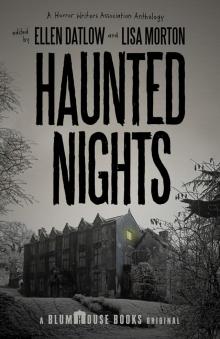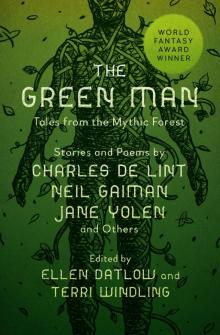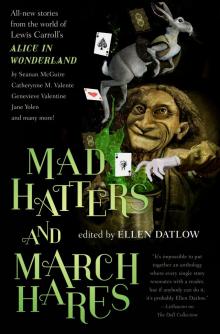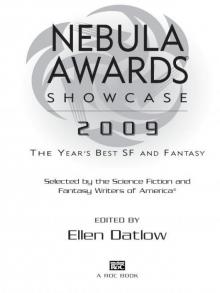- Home
- Ellen Datlow
The Green Man Page 15
The Green Man Read online
Page 15
The Grafter had attached tomatoes to narrow tubing, in case any plants needed red infusions.
He had grafted morning dew to a picture of a Disappeared Person so that he would never stop weeping.
“If we’ve found the Grafter’s home, why can’t the General?” said Lucia.
“Ah!” A voice echoed through the trees. Some twigs on the ground twitched and took the shape of a man’s hand. Hugo pulled into view a tall, thin creature made of twigs. A green fog settled onto his frame, and hazy green arms and legs and a face took shape. Leaves sprouted into a tunic, and spiders were knitting a webbed robe. The spiders dangled off the ends, clinging for dear life, because this green-fog man waved his arms as he exclaimed, “Don’t you see? Don’t you hear? Oh, wait! You don’t have your forest-eyes or ears yet, do you?”
He pointed upward. He had stretched the stars into a fleet of eardrums to collect every plot in the General’s house, every whisper in Rio Seco.
“My fish and birds listen to the heavenly ears, and we are warned before he comes. We made the mistake of trusting the vultures.”
“I’m getting my forest-ears,” said Hugo. “What’s that moaning?”
“The cries of those locked in the camp,” said the Grafter quietly.
Hugo sank onto the ground. The cries made an underground river that flowed outward, trying to reach through the forest back to Rio Seco. Hugo recalled the father he had never met. Where was his resting place? He missed the wonderful Musician who had taken care of him, too—was he safe?
When Lucia stroked Hugo’s red hair, his burning thoughts passed through her skin. That is finally what love does: It lets us read the insides of people to save them the pain of speaking. She grieved for everyone’s lost sons, daughters, husbands, wives, friends. Why had she been selfish, planning to fly away in a new world with only herself and Hugo?
The Grafter was desperate to rescue the prisoners. He had grafted vines to thorns, hoping to cut through the barbed wire around the camp. But sweet vegetation is helpless against such sharpness.
A huge padlock was on the gate. He once sent porcupines to pick the lock with their quills, but the guards shot every one of them.
His underground elephants volunteered to surge under the camp and blast it sky-high, but the bars went too far into the earth.
“Wait a minute,” said Hugo. “Did you say the camp has a padlock?”
“A very big one,” said the Grafter.
“Would a very big padlock need a very large key?”
“I would think so.”
“Oh!” said Lucia. She was not only beginning to read Hugo’s mind. She was beginning to hear the notions in his head before words were formed.
“The General wears a large golden key around his neck,” said Hugo, gripping Lucia’s hand.
Overhead, the birds never stopped painting the sky with their bodies. Despite her fear, Lucia ached with pleasure. Pink with green! Disorderly bands of orange with rippled chartreuse! Who ever heard of such pairings! She would fight for a world like this.
“When the army finds us,” she said. “We’ll tear the key off the General’s neck.”
“Yes,” said the Grafter. “This time, we won’t hide.” When the General was within range, the Grafter would hurl a vine to capture the key.
“Very dangerous,” said Hugo.
“Extremely,” said the Grafter, and the green fog of his skin paled.
Spiders knit a canopy to shelter them. Lucia worked bobbin and thread, hooking out the start of the parachute. There was no time to waste. Hugo and the Grafter helped. The stars flickered, as if they, too, were nervous. The deer used periscopes—the eyes in peacock feathers grafted to branches—to look past the trees toward Rio Seco. Robins and cardinals brushed the air red as flames, as if to announce: Step into our fire. Hand over the key.
As night fell, Lucia asked the Grafter for his story.
“The soldiers ripped out my garden,” he said, “but my brain kept sprouting gardenias. My body turned into my dreams. I became twiglike from so many dried-up memories of people who were gone, and I kept my tears to myself so that I seemed surrounded by a fog, and I wanted to explode into greenness whenever I walked past those plain houses with their sad people. When I planted a bird-of-paradise, they dragged me away, but the forest opened before me like my soul. It was easy to vanish inside its greenness, because it was my dream. The trees lifted me to safety, since I was already a man who was half a plant. When the birds greeted me, all I had to do was graft onto them the shades I had trapped inside me, and I could paint the sky.”
Lucia reached through the green mist of the Grafter’s hand until she touched the bones made of twigs.
The hours ticked along until a fox streaked to their canopy at dawn and gasped, “There’s a reward for your capture!” Lucia’s legs felt as breakable as twigs.
The Grafter used a periscope to observe the vultures hovering over the army, which stretched as far as he could see, kicking through the streams. The General was in the lead, on horseback. Gold gleamed around his neck. “There it is,” said the Grafter, forming a vine into a lasso.
A glint of swords from the army hit the fish-scale mirrors hanging on the leaves. Streaks of light zapped the trunks of trees, cutting open trapdoors. Out sprang gremlins that looked like frogs made of rotting wood pulp. They shed beetles as they ran at Lucia and Hugo, who grabbed mushrooms to fling elephants at them. Half of the wood gremlins got crushed, and the other half got infuriated at the idea of anything trying to crush them.
The Grafter used a vine to hoist himself and Lucia and Hugo to the high branch of an evergreen. The gremlins clamored around the base of the tree.
“Hold on!” shouted the Grafter, throwing a lasso toward the General.
A sword chopped the vine in two as it hit the General’s neck.
“I’ll try one,” said Hugo, fashioning a new lasso as Lucia tied one herself and so did the Grafter. They would all try at once.
The General rode closer. Looking through a periscope, Lucia saw the brown spots on his bare head, and she thought: People like the General get pictured as gods or monsters, so we think we’re helpless against them. And who was in the back flank of the first guard? The General’s Wife and the Colonel. Lucia’s breathing quickened. The General’s Wife had helped her once before.
Hugo and Lucia gripped their lassoes and when the General was in their sights, the gold key reflecting the light, the Grafter yelled, “Now!”
Three lassoes spun out from their hands. The vultures grabbed Lucia’s vine and almost pulled her from the tree, and the elephants started a stampede against the army. Many of them fell. The horses shied up and whinnied, unable to ride past the mountains of dying elephants, and the birds darted so fast to distract the soldiers that they smeared the air with the colors of heat, reds and yellows and oranges, but the vultures attacked them. “No!” screamed Lucia, horrified to see the birds being cut in two. The Grafter gripped another vine and chanted, I’ll get the key, I won’t give up, and Hugo broke off a branch to pound away the wood gremlins who had clawed their way up, while foxes shot out from the underbrush and died under the horse’s hooves.
Flying opossums swarmed toward the treetop, screeching, swinging their ratlike tails. They attacked Hugo first. Lucia was bitten as she punched at them. They dug their claws into Hugo’s shirt, giving snorts of pleasure. The General stopped his horse to enjoy the show, and while the Grafter was distracted, knocking the flying opossums off Hugo, a soldier threw a rope and pulled the Grafter to the ground. As his fog-body sank into the grass, the soldiers tore the leaves of his tunic. Lucia was hitting at opossums and throwing pinecones to get the soldiers off the Grafter, but the soldiers laughed. They chopped the Grafter to bits as if they were cutting up kindling, throwing a leg in one direction and the pieces of his arm in another, and they scattered his green hair. When the Grafter was killed, the opossums carried Hugo out of sight as he called out, “Lucia! Escape!”
Lucia grabbed a vine, and as a soldier was climbing the evergreen to get her, too, she swung over the left flank of the army and landed near the horse of the General’s Wife and said, “Madame! Oh, please.”
The Colonel rode to her side. The General glanced at them over the legion of soldiers, but he was more interested in having his horse trample the pieces of the dead Grafter.
“Let the prisoners go, bring Hugo back, let us create a forest in the Grafter’s memory,” Lucia said. “Please. You saved me once before.”
“What’s she talking about?” said the Colonel. He was as handsome as a lion—grand but dangerous.
“Save you? I did no such thing,” said the General’s Wife, and a dent appeared near her jaw, a cut of flesh.
The Colonel grabbed Lucia by her long dark hair.
“Madame,” said Lucia. “Save our greatest violin player. I’ll give my life in exchange for his.” Lucia twisted her head, despite the Colonel’s grip, to look at the General’s Wife.
“I want the reward money,” said the Colonel. “A violinist—who cares?”
They come to us all, those few moments when we can say, “This is when I decided the entire course of my being.” The General’s Wife’s could choose Hugo, or the promise of the Colonel buying her gifts.
Lucia had a moment come upon her, too. She could say to the Colonel, I know about your affair with the General’s Wife. I will announce it so that the General hears it. She got ready to yell, but she stopped. She was incapable of betraying anyone, even someone who deserved it.
The General’s Wife smiled. Lucia recoiled to see the cracks opening on the face of the woman for whom she had made countless lace gifts.
Having made her terrible decision to do nothing but see her lover collect a reward, the General’s Wife belched out several toads, and the Colonel, laughing, coughed up some rats.
But Lucia was meant to be free. She was a teller of stories in lace. Spiders are also weavers and storytellers, and they emerged from the churned-up earth to wind her in a cocoon. Before the astonished eyes of the General’s Wife and the Colonel, the tarantulas sat on the cocoon and waved their stingers and pretended to plunge them into Lucia. She lay very still.
“Well,” said the Colonel. “That’s the end of her, too.”
“How awful,” said the General’s Wife, her voice shaking. That is the trouble with people who are partly good and partly bad. They think it is enough to feel bad and apologize for their weaknesses.
“Everything will be forgotten soon enough,” said the Colonel.
Lucia did not dare breathe. The spiders dragged away her cocoon, and she did not move for a long time, until the land was mute.
It felt like days before she broke through her winding sheet. Gremlins pranced around fallen branches. The foxes limped; the trees were chalky, as if shock had drained them of chlorophyll. Under a birdless sky, Lucia walked to the fir tree where the Grafter had met his end. She tried to patch twigs together, but nothing held. Sprigs from his hair crumbled in her hand. She ordered herself to be strong. The Grafter would want her to free the prisoners—and now that included Hugo. She lay on the earth as if it would whisper about him—and, surprise! Musical notes—faraway and indistinct, but true notes, real ones—trickled through the ground.
Hugo was playing his violin, forced to entertain the soldiers at the camp. Her refrain became: My body will play the songs he sends! His music will pluck my veins, and that will keep me alive.
She often put her ear to the ground, to follow the trail of notes. Sometimes a clattery, odd music added a harmony. She did not know what that was. She knew only that she must go forward, through the lifeless forest.
A fox brought her honey and colorless berries.
“Hello, my friend,” she said. “What happened to your pretty coat?”
“Gone away,” said the fox.
“Where is Hugo?”
“Gone away,” said the fox. “Why don’t you tell everyone how much has disappeared?”
She got out her bobbin to sew a lace picture of the battle. The spiders lent her thread when she ran out of her own. If she was captured, she would leave the truth behind. The Colonel was wrong: Nothing would be forgotten. Every night she folded her lace picture up like a knapsack and wrapped her arms around it, and the spiders protected her.
At six-thirty every morning, thinking of Hugo kept her sane. Otherwise her loneliness would have no curve of beginning, middle, and end. But how much time had passed? Three days? Two weeks? Where was the other side of the forest? The clattering noise grew louder as Hugo’s music grew fainter.
One day she heard only a short measure of sound.
“Hugo!” she cried. “Don’t give up! I’m on my way!”
Then a day arrived of only a few scattered notes.
The hour came when she put her ear to the dry earth, and there it was—quavering toward her, the last, weak note of a violin. She spun a lace net to catch that note and held it against her thudding heart. Grafted to her, kept alive by her heartbeat, the note made her weep. Her tears dampened the bed of the forest, and dragging herself forward, she cried a green river from her green eyes. It spread into tributaries. Dead seeds cracked back to life; plants pushed to the surface. Water seeped back into the trees. A fox lapped at the green river and his coat glowed, but Lucia crawled onward, sobbing, wanting only to keep alive Hugo’s last note. She heard the clattering again. What were those things jutting out of the forest’s wet floor? Bamboo? Saplings? They were now poking out of the moist ground, set loose by the water of her tears.
She stopped and lifted her head. “Hugo?”
A blue river was pouring toward her through the trees.
“Hugo!” She flung herself into the blueness rushing to meet her greenness. The rivers converged into one long blue-green waterway. She swam in it, legs kicking and arms flailing, her lace story folded inside her dress.
Two gray birds dipped into the river and flew into the sky, where they retouched it with blue and green.
She rode the water to the other end of the forest, where a blank vista was blocked by a prison. But over its walls, gushing around its padlock and barbed wire, blue streams cascaded. She bobbed in the water while the earth stormed and shifted. Rising out of the swampy ground were neither saplings nor bamboo, but skeletons. That clattery music was from those who had died in the camp, their bones rattling the land. The bones knit together along the riverbanks into a lacework of the dead who began to roar, and the roar brought up more green shoots that snaked like sea serpents—like living thread stitching through the cloth of the earth and digging under the sunken bars of the prison.
Lucia thought her eardrums would shatter. The landscape convulsed in one world-stopping scream.
It was the Grafter. The Grafter was among the furious dead. She had watered his chopped-up pieces with her tears, and the cuttings of the Grafter had been resown and had attached themselves onto living matter, and all this time he had been burrowing forward, out of the forest, below the camp. He had wrapped his arms around the foundation and was shaking it. His battle cry was commanding the vines to help him uproot the prison.
The earth tilted and showed itself remade as the face of a shrieking green man. The Grafter had taken over the whole visible world. His open mouth was an ocean, his beard and hair were the forests, his eyes were volcanoes.
He threw the prison off his face as if it were a mosquito on his nose. Elephants tossed the guards into space. Anyone that the Grafter did not want clinging to him he flung off, sneezed off, onto the sharp points of the stars.
Thin bodies fell out of the upended prison, to the safety of the blue-green water or the trees that were now the whiskers of the Grafter. Hugo tumbled out with the other prisoners. Lucia saw him clinging to a fern—part of the Grafter’s mustache—and she swam to a riverbank and climbed out and ran along throbbing ground that was now the skin of the Grafter.
Hugo’s face was stained with trails of blue. When she collapsed with
her arms around him, they clung together, too tired to speak.
The General’s Wife ran to the Colonel, but he said, “Go away!” She raced outside and sap gushed from the trees to trap her like an insect. The Colonel met the same fate—caught in amber-colored sap, thrown past the moon.
The General was pecked to death by his own vultures and pitched toward Saturn, where he spun alone, the gold key twisting on his neck.
The swords and guns of the army—what good were those against the Grafter bellowing them into oblivion?
When the world righted itself, Lucia gazed into Hugo’s eyes: All of sky, all of ocean. “Lucia,” he said, because just saying her name was the same as saying, “I am in love.” She touched the new face of the land and said, “Grafter, can you return? Shall we finish the parachute and sail away?”
“No.” His sigh made the planet rumble. “Thanks to your tears, I’ve grown into the entire world, my dearest. It’s not so bad to be here with the dead. We can help them go on living, if we remember them.”
The earth had become so spongy from so many tears that it was easy for skeletons to dislodge themselves. They returned to Rio Seco with their stories: One had been killed for writing a play! One had died in prison for questioning the politics of the General!
The Musician who raised Hugo embraced him and said, “I knew your music would rescue us all.”
On a clear morning, Hugo was startled by the ghost of his mother gliding toward him, arm in arm with the ghost of his father.
A skeletal couple touched Lucia’s shoulder, and she said, “Kiss me, Mother. Kiss me, Father.”
Blue and green birds stuck out red tongues and stared with their yellow eyes. With blue, red, and yellow, every possible color can be made.
The elephants cried, “There’s aquamarine! A banner of violet! Rose!”
Tan. Black. Ochre. Cream.
The Grafter stayed busy. His roots visited the barren lands until Rio Seco was bursting with gardens.
“I’m going to think of you every hour, not just six-thirty in the morning, if you don’t mind,” said Lucia to Hugo.

 Inferno
Inferno The Best of the Best Horror of the Year
The Best of the Best Horror of the Year When Things Get Dark
When Things Get Dark A Whisper of Blood
A Whisper of Blood Echoes
Echoes Blood Is Not Enough
Blood Is Not Enough Haunted Nights
Haunted Nights The Best Horror of the Year Volume Eleven
The Best Horror of the Year Volume Eleven The Green Man
The Green Man The Dark
The Dark Mad Hatters and March Hares
Mad Hatters and March Hares Nebula Awards Showcase 2009
Nebula Awards Showcase 2009 The Devil and the Deep
The Devil and the Deep